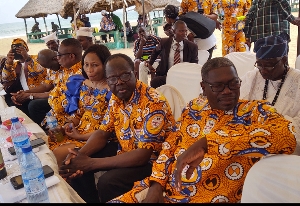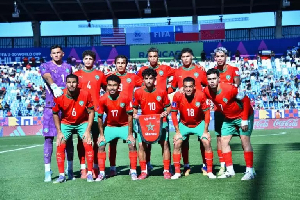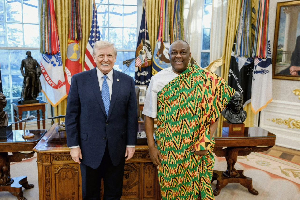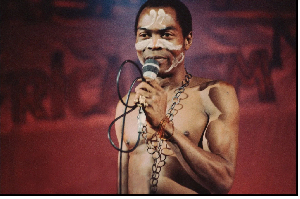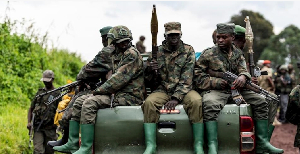A delegation from the Council of Ewe Associations of North America (CEANA), led by its president, Dr. Tsatsu E. Nyamadi, joined hundreds of Ewe indigenes in Nigeria to celebrate their maiden Ewe National Cultural Day.
The association's representatives in Ghana, Togo, and Benin, and Torgbi Agbelorm-Agbotokor II, Chief of Salo-SSokutsime in the Anlo Traditional Area, were also present at the event.
The event was celebrated under the theme "Strength for Peace."
Speaking at separate events in Badagry, Lagos, and Atisese villages in the Ojo Local Government area to mark the occasion on March 29, 2024, Dr. Nyamadi underscored the importance of peace, tolerance, and a unity of purpose among all Ewe people, not only in Nigeria but across the globe.
"Coincidentally, the motto of the Ewe Indigenes of Nigeria is 'Strength for Peace.' The delegation from CEANA is here because we believe in strength for peace. We eat the same food, share the same culture and traditions, speak the same language, etc.
"As such, working together and putting our skills, talents, and resources together is the only way we can help develop our communities and the Eweland. I therefore appeal to all Ewe Indigenes in Nigeria and all Ewes across the globe to unite and work together as one team. This is not an easy task, but there is no other way; with hard work, dedication, and commitment, I believe we can achieve our desired goals," he said.
He commended the organizers of the event, especially the President of the Ewe Indigenes of Nigeria, Albert Aiyeadun Atisese, for their commitment to ensuring that all Ewes in Nigeria lived in peace and unity, pledging CEANA's readiness to assist in any way possible to continue to maintain peace and enhance the socio-economic well-being of the people.
"As many of you might have known, CEANA is a charitable non-profit organization formed in 1993 and serves as the umbrella for twenty (20) Ewe Associations in North America. CEANA’s main objective is to promote collaboration among Ewes in North America and harness their talents and resources toward the development of Eweland, i.e., Ghana, Togo, and Benin.
"For the past 30 years, CEANA has done this through the construction of clinics, classroom blocks, libraries, donations of medical equipment, COVID-19 relief supplies, pedestrian footbridges, donations of relief items to areas affected by the recent Akosombo Dam water spillage in Ghana, etc. CEANA also provides annual scholarships to deserving students pursuing senior high school education in Benin, Ghana, and Togo," Dr. Nyamadi indicated.
He encouraged all Ewes in America and Canada to join CEANA and make meaningful contributions.
"I want to quote the renowned African novelist Chinua Achebe in the following words: 'A man who calls his kinsmen to a feast does not do so to save them from starving. They all have food in their own homes. When we gather together on the moonlit village ground, it is not because of the moon. Every man can see it in his own compound. We come together because it is good for kinsmen to do so.' Let us unite and collaborate because in unity lies strength," the CEANA president said.
Torgbi Agbelorm-Agbotokor II, for his part, called on all Ewes across the globe to be proud of and embrace their culture and traditions and not allow political boundaries to divide them.
He called for unity and tolerance among all Ewe indigenes in Nigeria and other parts of West Africa.
Archbishop Emeritus of the Methodist Church, Nigeria, and Chairman of the Yoruba Unity Forum (YUF), Prince Ayo Ladigbolu, said the Ewe people are true Nigerians who originated from Ile Ife in the old Oyo empire.
"The Yoruba roots of the Ewe people could be traced to the Old Oyo empire and the ancient city of Ile-Ife. The story of the Ewes is one of great historical significance, as they trace their roots back to the Old Oyo empire and the ancient city of Ile-Ife," he said.
“It was under the leadership of Alaketu, a grandson of Oduduwa, that the Ewes embarked on a remarkable journey, migrating from Ile Ife during the twelfth century. The Ewe ethnic group of Nigeria stands as the descendants of those who journeyed from Ile Ife to various parts of modern West Africa before returning to establish their presence in Badagry and the coastal villages of Lagos State well before 1914
“Their rich history and cultural contributions are a testament to their enduring legacy, as documented in the BRIEF HISTORY OF THE EWES OF NIGERIA submitted to the President and the Commander-in-Chief of the Armed Forces, Federal Republic of Nigeria, in 2004. In addressing misconceptions, it is vital to recognize that the Ewe ethnic group is distinct from the ‘Agayin’ (Gnyi), both in historical and linguistic terms," he added.
Other members of the CEANA delegation who were at the event included its former president, Dr. Peter Nat Abochie; its public relations officer, Efo Steve Dei; Kossi Nutekpor; William Kumah; Miriam Tsagle; and Silvanus Dossou.
The delegation also visited the ancient palace and tomb of Torgbui Asakpo, Amega, the first king of the Ewes in Nigeria, as well as paid a courtesy call on the current Akran of Badagry Kingdom, HRM, De Wheno Aholu Menu Toyi 1.
Regional News of Friday, 5 April 2024
Source: Leo Nelson, Contributor
CEANA joins Ewe indigenes in Nigeria to celebrate Ewe national cultural day
Opinions


